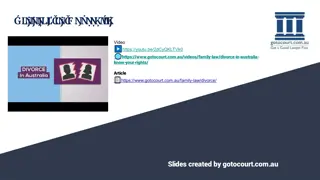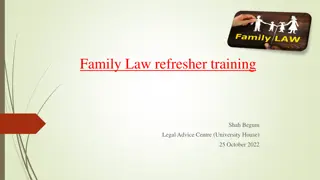Understanding Divorce and Domestic Abuse Laws
This content discusses topics such as divorce, property division, agreements, grounds for divorce, and spousal domestic abuse. It explores cases like Roley v. Roley, Rankin v. Rankin, and Outz v. Outz to illustrate legal aspects related to marriage dissolution and domestic abuse. The discussion includes insights on habitual cruelty, the relevance of the Russell test, and the evolving legal perspectives on spousal domestic abuse.
Download Presentation

Please find below an Image/Link to download the presentation.
The content on the website is provided AS IS for your information and personal use only. It may not be sold, licensed, or shared on other websites without obtaining consent from the author. Download presentation by click this link. If you encounter any issues during the download, it is possible that the publisher has removed the file from their server.
E N D
Presentation Transcript
FIRST HOUR: Divorce, Property Division, Agreements
Habitual, cruel, and inhuman treatment Habitual cruelty includes three types: - Conduct so brutal and unfeeling that it endangers the physical, mental, or emotional health of a spouse - Unnatural and infamous conduct that makes the marriage revolting to the other spouse - Spousal domestic abuse (physical abuse or a pattern of threats or intimidation, emotional or verbal abuse, forced isolation, sexual extortion or abuse, or stalking)
Is the Russell test still relevant? Spousal domestic abuse does not require corroboration for physical or emotional abuse. Roley v. Roley: Husband s hoarding behavior and personal hygiene issues might not qualify as spousal domestic abuse. Russell v. Russell: Both types require corroborating evidence. Unnatural and infamous conduct may be the best ground for divorce in similar cases.
Roley v. Roley The Mississippi Supreme Court held in a prior case that habitual, cruel, and inhuman treatment is reviewed as a question of law. Spousal domestic abuse applies in actions filed before the effective date of the ground (July 1, 2017) but tried after that date. The Court of Appeals in Roley declined to follow that precedent, viewing the issue as a question of fact.
Rankin v. Rankin The wife sought divorce based on spousal domestic abuse, alleging that her husband - called her names and belittled her in front of his congregation - abused her dog - kicked a suitcase into her and pushed her when she was pregnant - broke down a bathroom door after she locked herself in to escape his arguing - took the children from their home overnight because she would not have sex The chancellor denied divorce. A divided court of appeals reversed. A divided supreme court reversed the court of appeals.
Outz v. Outz (Miss. 1940). A husband has the right to decide where his family will live. A wife s refusal to follow him, without good reason, is desertion. Orr v. Orr (1979). Gender-based classifications in family law are unconstitutional. Stephenson v. Stephenson Stephenson: Outzis no longer good law. A wife s refusal to follow her husband is no longer considered desertion. Stephenson dissent: Courts should look to determine which spouse is acting reasonably and which is acting in bad faith to determine who is the deserter.
Divorce grounds in southern states Irretrievable breakdown Period of separation Alabama (incompatibility or irretrievable breakdown) Florida (Irretrievably broken) Georgia (Irretrievably broken) Kentucky (irretrievably broken) Texas (insupportability) West Virginia (irreconcilable differences) Arkansas (18 months) Louisiana (180 days if no minor children, 1 year if minor children) North Carolina (1 year) South Carolina (1 year) Virginia (1 year or for six months if spouses agree and no minor children)
Basic classification rules - There is a presumption in favor of marital property. - The burden of proof is on the spouse claiming separate property. - Separate property includes premarital property, property acquired after the cutoff date, property acquired by gift, and property excluded by agreement. - Cutoff dates may range from date of separation to date of divorce. - Active appreciation is marital. Passive appreciation takes the classification of the underlying asset. - Separate property may be converted to marital by commingling or family use.
Classification: Burden of proof Lageman: Husband failed to trace his separate property interest in a retirement account he did not prove the amount of separate funds in the account on the date of marriage. Doe: Husband proved that insurance policy premiums were paid with gifted funds. Wife failed to show any marital funds were used.
Classification: Geno v. Geno - Husband proved the value of his account at the time of marriage. - He proved the amount of passive appreciation on the premarital value. - The court rejected the wife s argument that the conversion rule should apply to retirement accounts, citing cases allowing tracing (in contrast to bank accounts). - The court held that family use of withdrawn funds did not convert the entire retirement account to marital. (Distinguishing Pettersen, where a husband actively managed his investment account).
Dividing mixed pensions Lageman: Marital fraction method of pension division: - Husband worked as a FedEx handler for 6 years prior to marriage. Divide the number of years worked during marriage (18) by total years worked (24). 75% is marital property. - He worked as a FedEx pilot for 18 years during marriage. Question: Does the marital fraction inflate the separate property interest when the premarital work was at a much lower-paying job? - The chancellor awarded him 55% of his pension.
Valuation Doe: Bowman: A chancellor erred in valuing vehicles, equipment, tools, and other personal property items in a lump sum. Courts have discretion in setting the date of valuation. As a general rule, assets should be valued closer to divorce. The court reversed for the chancellor to require valuation of each item. Assets may be valued at different dates.
Division stage: Marital fault Hammond: Coleman: A chancellor erred in failing to specifically address a husband s adultery in the Ferguson property division analysis (even though the wife received 55% of the marital assets). A husband s inappropriate communications with other women was marital fault that affected the marriage and could be considered in the court s Ferguson analysis.
Lacoste: Unequal division First round: Husband s business valued at $347,000. Wife awarded 54%. Reversed to value without including goodwill. Lacoste v. Lacoste Second round: Husband s business valued without goodwill at $14,000. Wife was awarded 91% of marital assets.
Marital debt Doe v. Doe: An $18,000 debt incurred to pay family expenses was marital debt. A chancellor erred in assigning the full debt to the husband without providing reasons for an unequal division. Recent cases appear to require that chancellors apply the Ferguson factors to determine assignment of debt.
Premarital Agreements: Bowman Provision 2: Any property acquired during marriage with separate funds will remain the owner s separate property. Provision 4: Any property jointly titled by the parties will be marital property. Held: Provision 4 applied - assets purchased with separate funds but jointly titled should be marital. Specific provisions govern over more general provisions.
Premarital Agreements: Hatton A couple agreed that - Their assets would remain their separate property, except - Property titled as joint tenants with rights of survivorship would be jointly held. Neither could sever the tenancy without the other s agreement. The chancellor refused to grant the wife s request to sell the house and divide the proceeds and the husband s request to grant him possession. The divorced couple held as joint tenants with rights of survivorship.




























